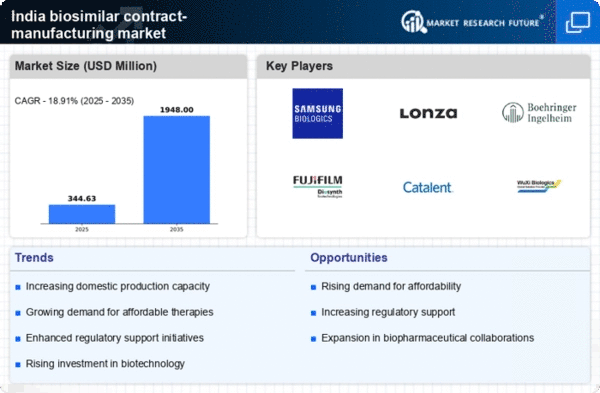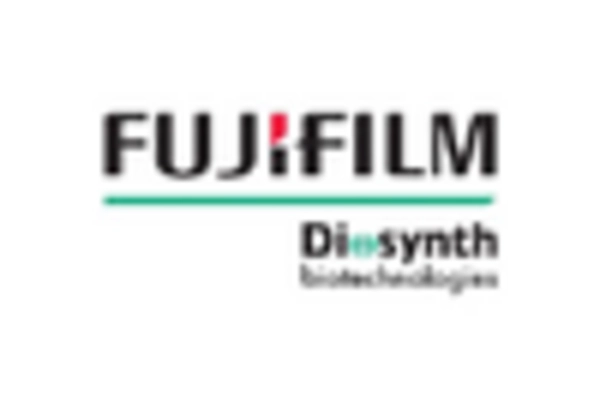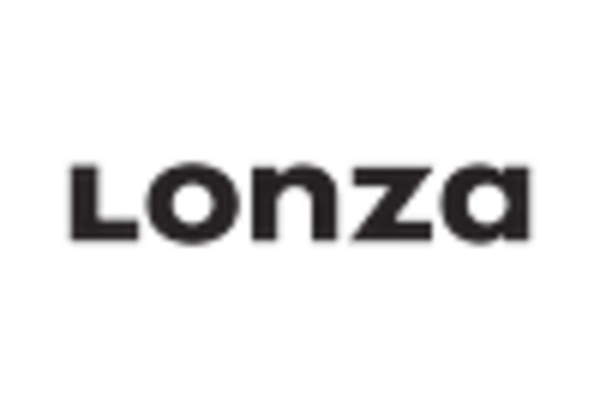Regulatory Support and Framework
The evolving regulatory landscape in India plays a crucial role in shaping the biosimilar contract-manufacturing market. The Indian government has established a comprehensive regulatory framework that facilitates the approval and commercialization of biosimilars. The introduction of guidelines by the Central Drugs Standard Control Organization (CDSCO) has streamlined the approval process, making it more efficient for manufacturers. As of 2025, the approval timeline for biosimilars has reduced significantly, encouraging more companies to enter the market. This regulatory support not only enhances the confidence of investors but also fosters innovation in biosimilar development. The biosimilar contract-manufacturing market benefits from this environment, as contract manufacturers can leverage regulatory clarity to expedite their operations and meet the increasing demand for biosimilars.
Increasing Healthcare Expenditure
The rising healthcare expenditure in India is a pivotal driver for the biosimilar contract-manufacturing market. As the government and private sectors allocate more funds towards healthcare, the demand for affordable treatment options, including biosimilars, is likely to increase. In 2025, healthcare spending in India is projected to reach approximately $370 billion, reflecting a growth rate of around 12% annually. This financial commitment encourages the development and manufacturing of biosimilars, as they offer cost-effective alternatives to expensive biologics. Consequently, contract manufacturers are positioned to capitalize on this trend by providing tailored solutions that meet the growing needs of pharmaceutical companies. The increasing focus on universal healthcare access further amplifies the demand for biosimilars, thereby driving the growth of the biosimilar contract-manufacturing market.
Growing Chronic Disease Prevalence
The rising prevalence of chronic diseases in India is a significant driver for the biosimilar contract-manufacturing market. With conditions such as diabetes, cancer, and autoimmune disorders becoming increasingly common, the demand for effective treatment options is surging. Reports indicate that by 2025, the number of diabetes patients in India is expected to exceed 100 million, creating a substantial market for biosimilars. These biologics offer therapeutic alternatives that are often more affordable than their reference products. As healthcare providers seek to manage these chronic conditions effectively, the reliance on biosimilars is likely to grow. Consequently, contract manufacturers are positioned to play a vital role in supplying the necessary biosimilars to meet this burgeoning demand, thereby driving the growth of the biosimilar contract-manufacturing market.
Advancements in Biomanufacturing Technologies
Technological advancements in biomanufacturing are transforming the landscape of the biosimilar contract-manufacturing market. Innovations such as single-use bioreactors and continuous manufacturing processes are enhancing production efficiency and reducing costs. These technologies enable manufacturers to produce biosimilars at a larger scale while maintaining quality and compliance with regulatory standards. As of 2025, the adoption of these advanced manufacturing techniques is expected to increase, allowing contract manufacturers to respond swiftly to market demands. This shift not only improves the economic viability of biosimilar production but also supports the rapid development of new biosimilars. The biosimilar contract-manufacturing market stands to benefit significantly from these advancements, as they facilitate the timely delivery of high-quality products to pharmaceutical companies.
Rising Awareness and Acceptance of Biosimilars
The growing awareness and acceptance of biosimilars among healthcare professionals and patients are crucial drivers for the biosimilar contract-manufacturing market. Educational initiatives and outreach programs have been instrumental in informing stakeholders about the safety and efficacy of biosimilars. As of 2025, surveys indicate that approximately 70% of healthcare providers in India are now familiar with biosimilars, leading to increased prescriptions. This shift in perception is vital, as it encourages pharmaceutical companies to invest in biosimilar development and manufacturing. The biosimilar contract-manufacturing market is likely to experience growth as more companies seek to capitalize on this trend, providing the necessary infrastructure and expertise to meet the rising demand for biosimilars.
















